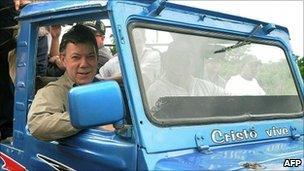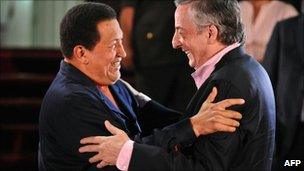Speedy thaw in Colombia-Venezuela ties
- Published

Juan Manuel Santos has set a new course for the Colombian presidency
"I prefer frank and direct dialogue," said the new Colombian President Juan Manuel Santos at his inauguration on Saturday about improving ties with Venezuela, "and I hope it can happen as soon as possible."
Three days later, Mr Santos is about to sit down in the colonial town of Santa Marta with the Venezuelan leader, Hugo Chavez. It follows months of intransigence under his predecessor, Alvaro Uribe.
It is a rapid turn of events.
Just two weeks ago, Mr Chavez broke off diplomatic relations after the Colombian government accused Venezuela of harbouring leftist Farc rebels.
So was a change of resident in the presidential palace in Bogota all that was needed to end this diplomatic conflict?
Personal dispute?
"The very personal nature of the dispute between Mr Chavez and Mr Uribe meant that it was going to be absolutely impossible for them to reconstruct," says Sandra Borda of the University of the Andes in Bogota.
Ms Borda said relations between the two leaders had become so toxic that it affected every aspect of the normal diplomatic channels.
"Such was the loss of mutual trust that almost no-one in either foreign ministry was talking to their counterpart on the other side. Mr Santos has made it very clear he intends to work differently."
But the diplomat and former Venezuelan Vice-Foreign Minister, Adolfo Taylhardat, doesn't believe a change in the Colombian presidency will provide the key.
"Mr Uribe wasn't the main obstacle," he says.
"For President Chavez, the biggest problem was the agreement over US access to seven military bases in Colombia. He wants to see that annulled and see his 'Bolivarian' ideas adopted in Bogota - neither of which he is going to achieve with Mr Santos."
As such, he is very doubtful that these talks are the start of a lasting friendship.
"I hope I'm wrong," he says, "but I doubt the 'peace' of this honeymoon with Mr Santos will last more than a month or two".
Prickly issues

Unasur head Nestor Kirchner has been mediating between Mr Chavez and the Colombian leader
Certainly on his weekly television address, Alo Presidente, Mr Chavez was making encouraging noises towards his Colombian counterpart.
He spoke of his desire to work with him and made a direct call to the Farc guerrillas to lay down their arms and hand over their remaining hostages.
The issue of the alleged presence of the Farc leadership on Venezuelan soil hasn't gone away, but Ms Borda thinks it unlikely that the two men will choose to discuss such a sensitive issue so early on.
There are more immediate issues such as the return of ambassadors to Caracas and Bogota and, crucially, reopening the border to bilateral trade.
Colombia depends on the Venezuelan market for its exports, particularly in meat, dairy products and plastic goods and Venezuela is in dire need of Colombia's goods.
The border region has been heavily affected by the dispute between Mr Chavez and Mr Uribe.
"I think trade is an area which is in both their interests to see re-established quickly," says Ms Borda.
"They can use it to build up their understanding on that issue before moving on to more complicated topics such as cross-border security."
Sabre-rattling
As for the speed of the thaw, Adolfo Taylhardat says it reveals the truth behind much of the rhetoric of the past few weeks.
"War was never a possibility and few of us who remember President Chavez ordering 10 tank battalions to the border with Colombia in 2008 took it seriously. At that time, not a single tank was moved and in this case too all talk of war was a bluff."
The real reason for the speed of the detente, he says, is the influence of other regional leaders.
Unasur head Nestor Kirchner and President Lula of Brazil both played a role in mediating the crisis.
Mr Taylhardat says "many leaders in the region were becoming annoyed at the extension of a conflict they saw as absurd and unnecessary".
From Colombia too, however, there has been a noticeable change in approach towards Mr Chavez.
Mr Santos was the candidate for the same conservative party as Mr Uribe and stood on a platform of continuity with the former president's popular security policies.
But Ms Borda says it is in international relations where he will distancing himself from the past, as voters in both countries have become tired with the constant bickering.
"I think Mr Santos wants to show that it is possible to maintain a firm hand with the Farc but without generating these constant tensions with Venezuela. He has learnt that, rather than berate Mr Chavez using microphones and inflammatory public statements, there are other, quieter ways to deal with him."
For many Venezuelans and Colombians, if that means the fiery rhetoric will wind down, and cross-border trade will pick up, then it will be a welcome change.
- Published9 August 2010
- Published6 August 2010
- Published21 June 2010
- Published4 August 2010